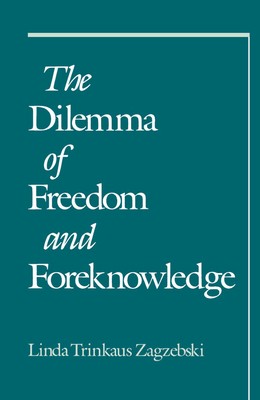
- We will send in 10–14 business days.
- Author: Linda Trinkaus Zagzebski
- Publisher: Oxford University Press, USA
- ISBN-10: 0195107632
- ISBN-13: 9780195107630
- Format: 16.4 x 20.2 x 1.3 cm, softcover
- Language: English
- SAVE -10% with code: EXTRA
The Dilemma of Freedom and Foreknowledge (e-book) (used book) | bookbook.eu
Reviews
Description
This original analysis examines the three leading traditional solutions to the dilemma of divine foreknowledge and human free will--those arising from Boethius, from Ockham, and from Molina. Though all three solutions are rejected in their best-known forms, three new solutions are proposed, and Zagzebski concludes that divine foreknowledge is compatible with human freedom. The discussion includes the relation between the foreknowledge dilemma and problems about the nature of time and the causal relation; the logic of counterfactual conditionals; and the differences between divine and human knowing states. An appendix introduces a new foreknowledge dilemma that purports to show that omniscient foreknowledge conflicts with deep intuitions about temporal asymmetry, quite apart from considerations of free will. Zagzebski shows that only a narrow range of solutions can handle this new dilemma. A compelling contribution to the field, The Dilemma of Freedom and Foreknowledge will
appeal to students and scholars of theistic philosophy and the philosophy of religion.
EXTRA 10 % discount with code: EXTRA
The promotion ends in 18d.07:58:15
The discount code is valid when purchasing from 10 €. Discounts do not stack.
- Author: Linda Trinkaus Zagzebski
- Publisher: Oxford University Press, USA
- ISBN-10: 0195107632
- ISBN-13: 9780195107630
- Format: 16.4 x 20.2 x 1.3 cm, softcover
- Language: English English
This original analysis examines the three leading traditional solutions to the dilemma of divine foreknowledge and human free will--those arising from Boethius, from Ockham, and from Molina. Though all three solutions are rejected in their best-known forms, three new solutions are proposed, and Zagzebski concludes that divine foreknowledge is compatible with human freedom. The discussion includes the relation between the foreknowledge dilemma and problems about the nature of time and the causal relation; the logic of counterfactual conditionals; and the differences between divine and human knowing states. An appendix introduces a new foreknowledge dilemma that purports to show that omniscient foreknowledge conflicts with deep intuitions about temporal asymmetry, quite apart from considerations of free will. Zagzebski shows that only a narrow range of solutions can handle this new dilemma. A compelling contribution to the field, The Dilemma of Freedom and Foreknowledge will
appeal to students and scholars of theistic philosophy and the philosophy of religion.


Reviews